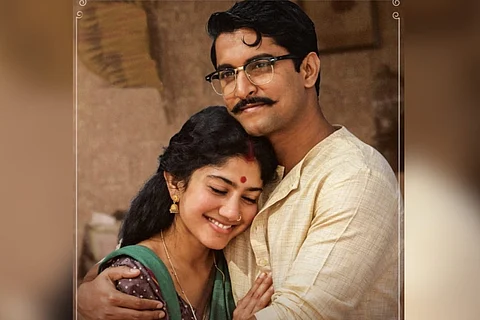

A young filmmaker is accused of plagiarism. He denies it and this leads to an intriguing court case where history and religion are called to question. Rahul Sankrityan's Shyam Singha Roy revolves around the theme of reincarnation, a popular subject in Telugu cinema. Nani himself reincarnated as a fly seeking vengeance in SS Rajamouli's highly entertaining film Eega. In Shyam Singha Roy, he is a fiery half-Bengali half-Telugu revolutionary who comes back for a reason (well, there's always one).
The first half is a light-hearted exploration of debut director Vasu's (Nani) struggles to make a short film. An assured Krithi Shetty plays Keerthy, a postgraduate student in psychology who is reluctantly roped in to act in Vasu's film. The romance isn't anything new; harmless flirting, some longing glances and a brief fumble that caused much uproar on Twitter when the trailer came out owing to Krithi's age (she wasn't 18 during the shoot but she is now, and I will not make any assumptions on her behalf). But the staging of these scenes is contemporary and has a freshness to it.
Madonna Sebastian as lawyer Padmavathi is charming in the supporting role. That overawed look she throws at senior lawyer Krishnamurthy (Murali Sharma) is hilarious. Though a small role, Madonna makes her presence felt.
The show-stealer, of course, is Sai Pallavi who plays Rosie, a Devadasi woman dedicated to a temple in a Bengal village. It's a role tailor-made for Sai Pallavi; she dances like a dream, exuding sensuousness and vulnerability at the same time. The camera cannot get enough of her expressive face that registers every flickering emotion. Watch out for the boat scene when a besotted Shyam Singha Roy (Nani) recites a poem he's composed on her; the tears reach her eyes but don't spill over. Her forehead crinkles in pain but she hides it almost immediately. One of my favourite things about Sai Pallavi is that she never lets you forget that she is playing a person on screen, not a pretty doll or an attractive body. When she dances, her face is never plastic. How can it be when her eyes are made of fire? The wet-white saree trope is usually used to eroticise and objectify the heroine, but when Sai Pallavi does it, Rosie only comes alive even more as a person. (Perhaps I'm competing with Shyam Singha Roy here, but indulge me...the command she has on screen is quite something).
Nani is convincing as the bewildered Vasu as well as the dashing Shyam Singha Roy. He seamlessly shifts between the two roles, making it easy for us to buy into the reincarnation premise. Telugu cinema isn't as open about addressing caste as the new wave of Tamil cinema, but Shyam Singha Roy pushes the boundaries by addressing untouchability and Brahminical patriarchy openly. Though Shyam's role does fall within the ambit of the upper caste saviour (I also wondered why he clings on to 'Roy'), we should perhaps celebrate the baby steps that mainstream cinema is taking in representing caste equations on screen.
The depiction of the Devadasi system comes from the reformist and abolitionist perspective. The practice of dedicating women to temples and the performing arts became exploitative over the years, and was finally banned all over India in 1988 (the southern Madras Presidency did so much earlier, in 1947). However, not all Devadasi women were for the ban, and there were protests from within the community too. It is a complex debate that calls to question our understanding of morality, cultural ownership, caste and social contexts. Shyam Singha Roy simplifies the subject to amplify its leading man's heroism, though it is well-intentioned.
While the flashback makes a powerful impact, the reason for Shyam Singha Roy's return is weak. You're left with a 'huh?!' when you figure out why he had to come back. Rosie deserved better, and more importantly, the premise is left underexplored. I was also puzzled by Shyam Singha Roy's brothers; they're a product of an intercaste, multilingual union themselves, so what explains their behaviour? That's not answered anywhere in the script, though their actions are pivotal to the plot.
Despite the flaws though, the performances of the cast - lead and supporting - carry the film through, making it engrossing for the most part.
Watch the trailer of Shyam Singha Roy here:
Disclaimer: This review was not paid for or commissioned by anyone associated with the series/film. TNM Editorial is independent of any business relationship the organisation may have with producers or any other members of its cast or crew.